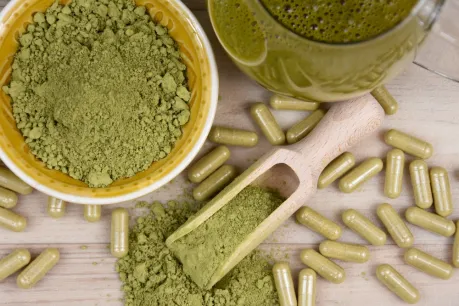Is Kratom Safe? What You Need to Know if You’ve Been Harmed by This Unregulated Substance

Injured?
Kratom is gaining popularity in the United States as a natural remedy for everything from chronic pain to anxiety, but beneath the surface, this tropical plant poses serious legal and health risks.
Despite its growing use (an estimated 1.7 million Americans aged 12 and older reported using kratom in 2021), federal health authorities have yet to approve kratom for any medical purpose.
At Morgan & Morgan, we’re keeping a close eye on kratom-related cases. Whether you've experienced harmful side effects or have suffered severe injury, you deserve to know your rights and legal options. Contact us for a free case evaluation to learn more.
What Is Kratom?
Kratom (Mitragyna speciosa) is a tropical tree native to Southeast Asia, where its leaves have long been used in traditional medicine. In the U.S., it is sold online and in stores as a powder, capsule, tea, or extract. Many users turn to kratom to self-treat conditions such as:
- Pain
- Anxiety and depression
- Opioid withdrawal
- Diarrhea or coughing
However, just because it’s sold legally in some areas doesn’t mean it’s safe or even lawful under FDA regulations.
FDA: Kratom Is Not Approved as a Drug or Dietary Supplement
The U.S. Food and Drug Administration (FDA) has not approved any drug or dietary product containing kratom or its key compounds: mitragynine and 7-hydroxymitragynine (7-OH-mitragynine).
This means that no prescription or over-the-counter drugs with kratom are FDA-approved, and that no dietary supplements containing kratom are considered lawful.
Kratom added to food is also classified as an “unsafe food additive,” making any food product containing kratom adulterated under federal law.
Put simply, kratom is not lawfully marketed in the U.S. in any form, whether as a drug, dietary supplement, or food ingredient.
Health Risks Associated With Kratom
Despite its marketing as a "natural" remedy, kratom can come with serious health risks. The FDA has issued multiple warnings about kratom’s potential to cause:
- Liver damage
- Seizures
- Respiratory depression
- Addiction and withdrawal symptoms
- Fatal overdose when mixed with other substances
Because kratom is unregulated, users often have no idea how much active ingredient they are consuming or whether it’s been contaminated with other drugs or toxins. That unpredictability puts consumers at risk of injury or worse.
Can You Sue Over Harm Caused by Kratom?
Yes, you may have legal grounds to file a claim if:
- You were harmed after using kratom.
- A loved one suffered injury or death after using kratom.
Given the FDA’s clear stance that kratom products are not lawfully marketed, manufacturers and sellers could be held liable under product liability laws, especially if they make false or misleading health claims or fail to warn of the risks.
What Morgan & Morgan Can Do for You
As America’s largest injury law firm, Morgan & Morgan fights For the People, including those harmed by unsafe or unlawful products.
If you or a loved one has been injured due to kratom use, we may be able to help you hold the manufacturer or distributor accountable and pursue compensation for medical expenses, lost wages, pain and suffering, or wrongful death.
You shouldn’t have to suffer because a company puts profits over your safety. Our legal team is here to hold them accountable.
If you’ve experienced adverse effects after using kratom or believe a loved one’s injury or death is linked to it, contact Morgan & Morgan for a free, no-obligation case evaluation. There’s no cost to get started, and we don’t get paid unless you win.

We've got your back
Injured?
Not sure what to do next?
We'll guide you through everything you need to know.
